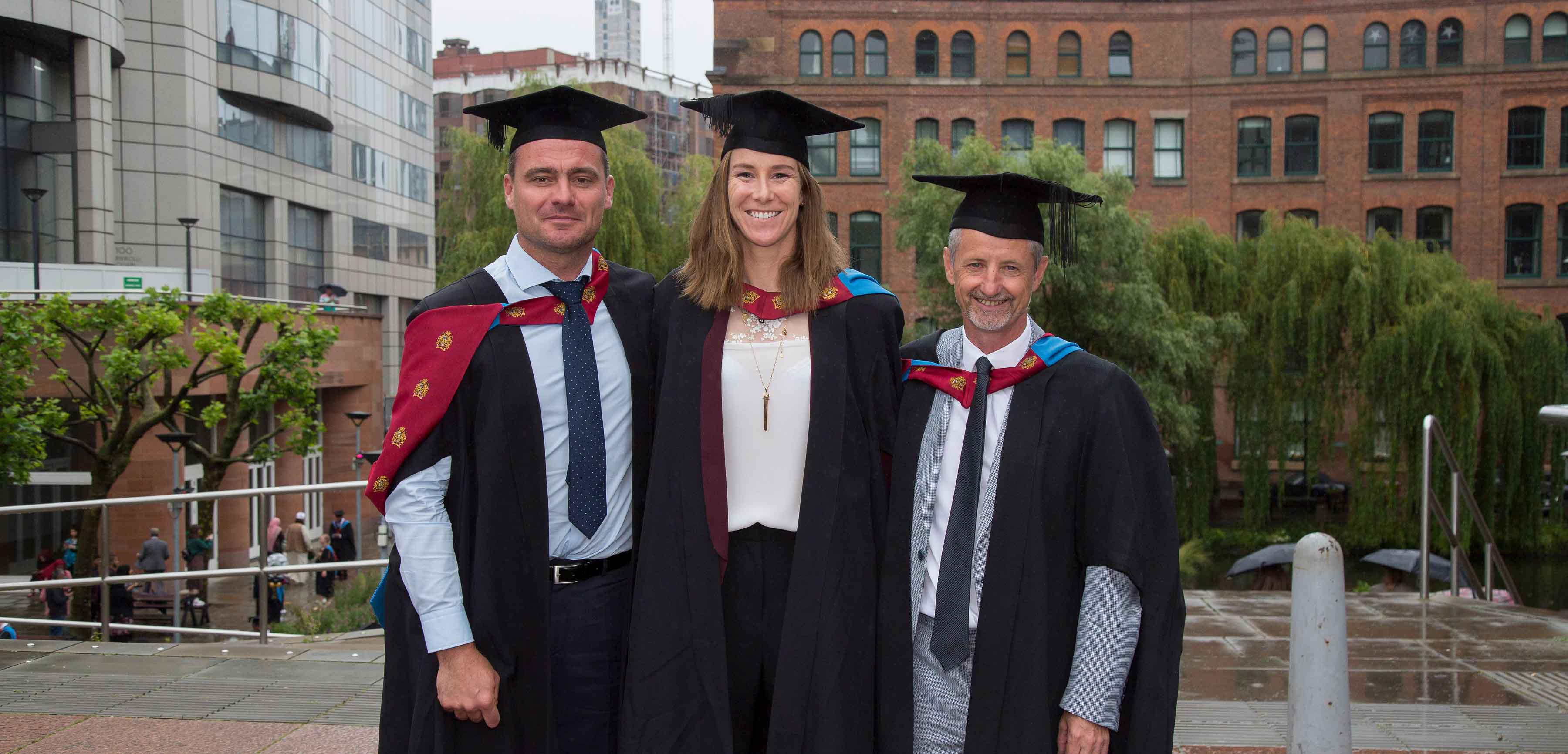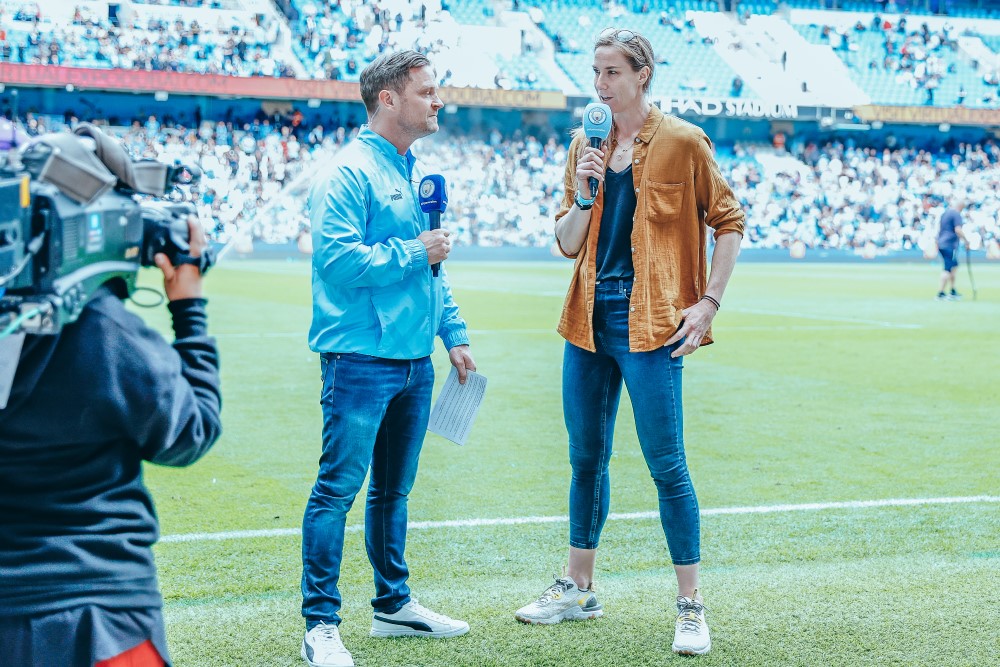Between the sticks
It was 110 minutes in. It was a record crowd. It was the home of English football.
In the summer of 2022, nerves jangled around Wembley as the England women’s football team wrestled with the mighty Germans to be crowned champions of Europe. Up stepped England forward Chole Kelly to score the decisive goal.
Overcome with pure joy, Kelly ripped off her shirt to celebrate and create one of English football’s most iconic images.
For England’s Lionesses, it would be their first-ever major trophy — and the first of any England senior team since 1966.
It marked a pivotal moment in the journey of women’s football in England. It had been on a long and arduous path, but it had now well and truly arrived and cemented its place in the hearts and minds of the public.
The game is a far cry from its part-time amateur days when players juggled full-time jobs with club and country commitments. Players are now household names, splashed across TV screens, and the main English league, the Women’s Super League (WSL), is fully professional.
Some players had a front-row seat to this explosion in interest, playing as the game became more professional and interest in the Lionesses flourished.
This included Karen Bardsley, the former Manchester City Women’s FC, England and Great Britain Olympic team goalkeeper, and University alumna who graduated from Manchester Met’s Master of Sport Directorship course in 2019.
And with the FIFA Women’s World Cup just around the corner, Met Magazine caught up with Bardsley to chat about her career, studies and England’s chances to take another step forward and become world champions.
With more than 100 games for Man City and almost as many for England, Bardsley was a stalwart between the sticks for club and country on her way to becoming one of the famous faces of the new era of women’s football.
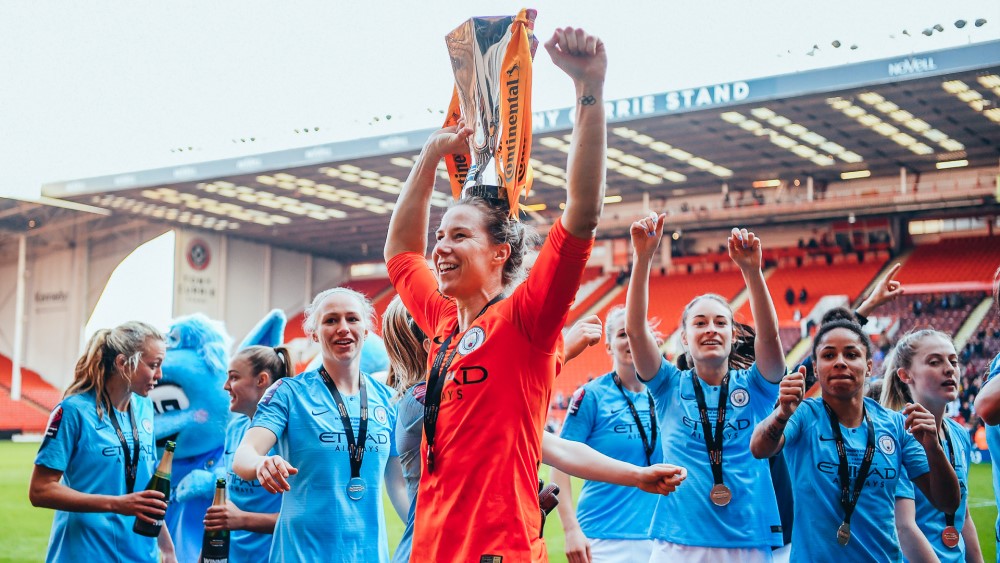
She’s now working behind the scenes, first as a project officer at Manchester City Women’s FC and now in a new role working alongside the new director of football for the women’s team, Nils Nielsen.
And that is while also appearing as a TV and radio pundit and sitting as an independent non-executive board director on the Manchester FA for women’s and girls’ football.
She remains as passionate as ever in helping the game she loves.
“It’s great to see,” said Bardsley on the profile of women’s football in England.
“I still think the game deserves so much more respect than it has, but it’s great to see that it’s on the right path — and that we have a path — and girls can have something to aspire to.
“When I think about some of my teammates’ experiences, when they were kids, they didn’t really have anyone to idolise or look up to as a career role model. Now they see the likes of Leah Williamson and Beth Mead, Rachel Daly, Mary Earps, and it’s normal. They talk about normal things that are affecting normal people – they’re relatable. They’re empowering people to take control of their lives and their careers. I think that’s really cool.
“I feel really fortunate to see the stuff that the Lionesses have done. Now you can see the opportunities that young girls in schools are starting to have with some of the good work that the Manchester FA is doing.”
Bardsley was born in the US and grew up in Santa Monica, California, to English parents from Stockport who passed on their love of football in a ‘typical English household.’
She progressed through the American sporting system — high school and college football — where the game for women was far more advanced than in England and had greater prominence. The US women’s team is the most successful in international football.
It was not without its difficulties, however, as Bardsley experienced serious injury setbacks — including a leg break at 15 and another in 2003 while playing college football for Cal State Fullerton, which unfortunately ruined her first call up for the England team.
But she still earned several prestigious football honours and graduated with a graphic design degree. Bardsley kept her dream of turning professional alive after graduating and she eventually found her way to New Jersey Sky Blue FC.
She played for almost four years, finally getting called up to the England squad again.
“Having an English family and heritage — it really meant a lot to me. It shaped my identity growing up,” she said.
“I ended up finally getting called up with England. I just had so much fun with the girls and I just felt like I belonged there.
“It felt like I could be a part of something bigger and special and almost like a pioneer, which I thought was really attractive. But then, ultimately, it was just me representing my family.”
In 2011, Bardsley decided to make the move to Europe, playing first in Sweden before joining Lincoln Ladies for a short stint in 2013.
But big things we’re just around the corner. She had her eyes on Manchester City, a city she was, of course, very familiar with and had plenty of family still living in the area.
The club — well established in the men’s game — was developing its facilities in east Manchester but was also eyeing up the top league for the women’s game, where interest was growing all the time.
Bardsley didn’t wait around, instructing her agent to approach the club to see if they would be interested in talking to her.
“Rumour had it that Man City was going to bid for a top licence (for entry to the WSL),” she recalled.
“So I waited around to see if that was going to happen, and it did.
“At the time, they said that they had their squad planning all done. They knew they had the spine of the team and what they wanted it to look like, and I thought, ‘oh well, that’s disappointing.’ And then a month later, I got a call when I was on my way to Manchester Airport to go back to California for Christmas.
“My agent said, ‘Gavin Makel (Managing Director of Manchester City Women’s Football) has changed his mind. He wants to speak. Are you going to be free?’
“I said, ‘Well, wow, I’m leaving tomorrow for California. I’ll be at Manchester Airport in the hotel at 7pm if he wants to come and meet me’.
“About 10 minutes later, he said, ‘Yeah, I’ll meet you there.’
“I was trying to play it cool and ask loads of questions, trying to feel it out, understand what kind of guy he was, what the vibe of the club was, and if they were really committed.
“And I said to him, ‘I’ve been promised all this my entire career. Show me what you’re going to do differently.’ And he basically said, ‘Well, this is the City Football Academy. We’re three-quarters of the way finished with it. This is where you’ll be playing in 2015.’
“And I was like, ‘Alright, you guys are going to deliver. This is cool.’ I was really excited about the prospect of being treated like a professional footballer for once in my life.”
This was 2014, when the game was still managing a transition from part-time to professional. At that time, Bardsley was one of a handful of full-time professionals with the women’s team, while others mixed their on-pitch commitments with full-time jobs.
This evolved rapidly as more full-time professional players were established, and Man City Women’s FC became one of Europe’s hot tickets.
Bardsley initially trained at the club’s former Platt Lane facility with the under-18s men’s team, a facility now home to MMU Sport, where the University’s teams play and train.
She said: “I think the goal was to stay up — I want to say we finished fifth or sixth, but then we beat Arsenal in the League Cup final.
“It was an awesome time to be a part of it. And then, in 2015, we became more and more successful. I think we qualified for the Champions League in 2015, and then obviously with the World Cup and the success that we had there, bringing home the bronze medal, beating Germany for the first time, winning our first knockout game — there were so many firsts that year.
“The game had just exploded.”
It would only get better for Bardsley over her career at City, with eight major trophies won and travelling around Europe to compete with the best in the Champions League.
There were countless remarkable highlights on the pitch, but it was a journey fraught with difficulties, injuries and uncertainty.
It was, undoubtedly, a glittering career for the decorated shot-stopper that gave her a front-row seat to see and be part of the growth in interest in the women’s game.
But the greatest enemy of all professional athletes is never far away, and no one can play forever. Conscious of the injuries she had picked up taking their toll, her attention turned to needing ‘something to fall back on.’
Supported by the Professional Footballers’ Association, she enrolled on Manchester Met’s Master of Sport Directorship degree, a part-time executive-level course delivered over two years. The world’s first qualification of its kind, it is aimed at professionals who want to gain the knowledge and skills that prepare them for the role of sporting director. The course also provides two Women in Sport Leadership scholarships each year to boost the number of women in the wider sport industry.
“I started because I realised I had quite a lot of downtime,” said Bardsley.
“I felt like I needed some intellectual stimulation, and I thought a challenge would help me balance football as well because I came home and was just twiddling my thumbs.
“I thought that if I have something to do, it’ll help me look forward to football. Because sometimes, you come home and you overanalyse things, you pull things apart, then you’re thinking about it and become obsessed. And that’s not healthy either.
“I think that was really, really helpful for me to not only work towards my future but also help me look at my present environment with a new lens.”
From 2017 to 2019, she studied on the course with other sport industry professionals, even completing her dissertation on Man City.
She added: “I met a lot of great people on the course that I still keep in touch with from my cohort. It’s created a really great network of people for me to bounce ideas off or stay in touch with or even just reminisce with.”
Bardsley gets to use the skills learned on the course with her new role at Man City, helping with data insights and player development, as well as sitting on the board of the City Football Leadership Institute.
While another interesting career turn for the former goalkeeper was becoming involved in broadcasting as a football pundit.
As a player, a camera-shy Bardsley steered away from becoming too involved in the TV side of the game.
But opportunities after retirement to act as a pundit came her way. TV viewers may have spotted Bardsley acting as a pundit during Premier League and Champions League games and during the triumphant Euros win.
They may see her on our screens during this summer’s Women’s World Cup held in Australia and New Zealand. The chance to travel to those countries and be part of the tournament is something that Bardsley relishes — and she will naturally be rooting for England to lift the trophy for the first time.
She said: “It’ll be fascinating to see how the team manages that and how the girls manage it. I think they’ll be great. They’ll be confident. They’ll be so eager to have that winning feeling again. But I think, ultimately, no one can ever take away what they’ve done, which is really cool.”
Supporting the game
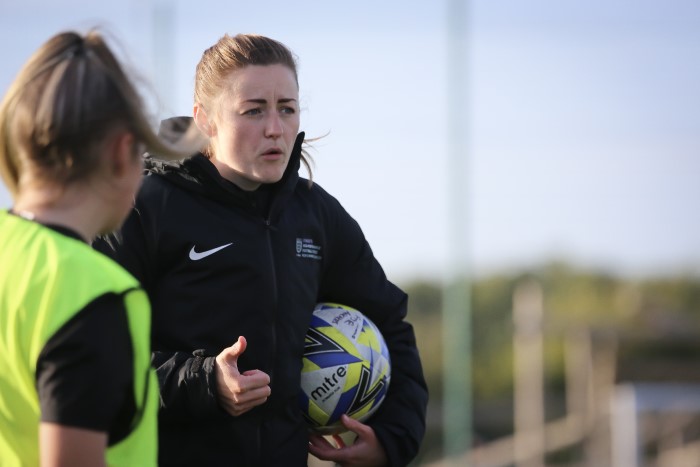
Manchester Met is one of 10 specialist high-performance centres for women’s football in England.
The University provides an educational and community[1]based hub to recruit, develop and deploy coaches to lead and inspire development within the women’s and girls’ games.
It is based at the University’s city centre campus, which includes the Platt Lane Sports Complex and Manchester Metropolitan University Institute of Sport.
It also hosts the FA Women’s High Performance Goalkeeping Centre, which sees students and coaches working with female goalkeepers to develop their skills as well as providing dedicated goalkeeper coaching experience.
The Women’s High Performance Football Centre sees Manchester Met experts and a specialist Coach Development Officer supporting talented coaches within the women’s game, including those working within Regional Talent Clubs and FA Women’s National League clubs.
The University also collaborates with the Football Association’s grassroots department to aid the development of newly qualified coaches.
This includes support for coaches within the professional game across the FA Women’s Super League and FA Women’s Championship, providing a connected learning experience for coaches working across the female game.
Sport science degree helps City defender Esme Morgan understand injury recovery
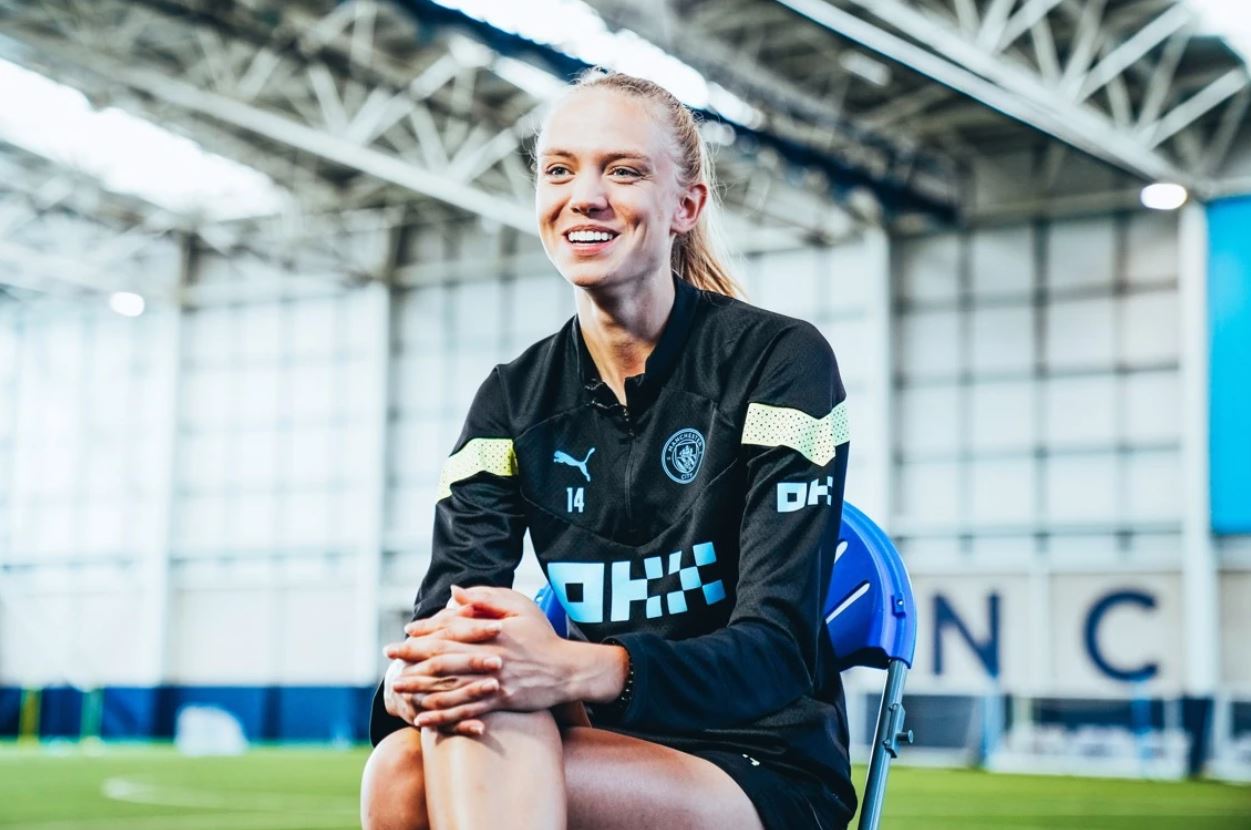
Manchester City and England footballer, Esme Morgan, has credited her studies in sports science at Manchester Metropolitan University’s Institute of Sport in helping her recover from injury and get back on the field.
After spending almost 12 months out of the game due to a leg injury last season, she made her long-awaited return to Manchester City Women’s Football Club’s first team in August 2022.
Alongside playing full-time, Morgan studies on Manchester Met’s BSc (Hons) Sport and Exercise Science course, which she says helped her better understand her injury and the healing process.
She said: “It’s part-time and completely online, so it’s really flexible around my football.
“I find it really interesting; I just like learning new things – I’m a bit of a geek but I’m proud of it.
“I’ve always been a person to ask why I’m doing something anyway. I bet the physios got sick to death of me (when I was injured).
“I had less time (to study) when I was injured because the rehab hours are a lot longer (and) you have so many little things to work on (and) so much to try and improve on and get better at.
“I actually fell behind in my studies once I got injured, but they were very helpful in giving me an extension so I could catch up.
“(But) it definitely gave me a better understanding of my injury and the healing process that was going on in my leg, such as the length of time it was going to take me to get back to normal.”

